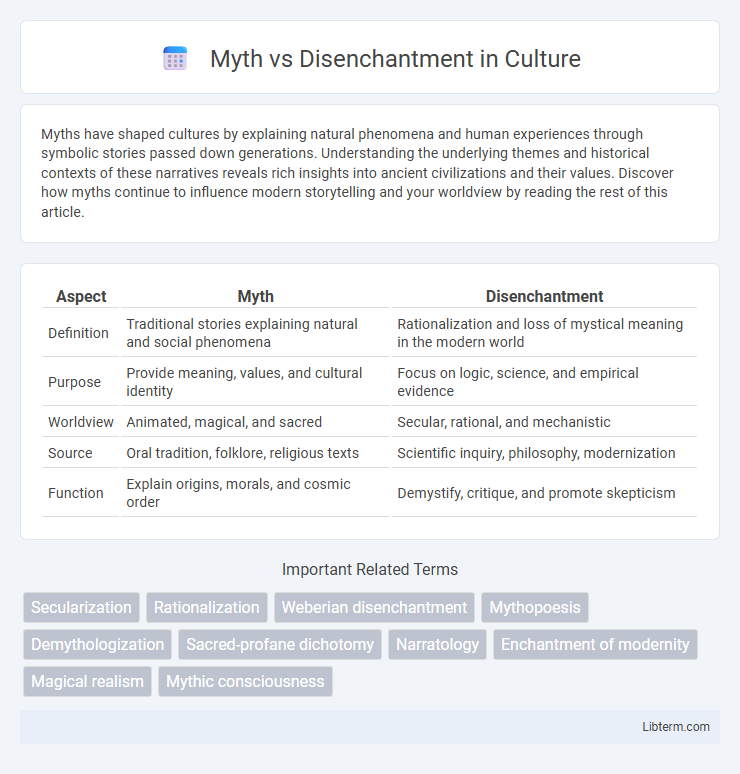Myths have shaped cultures by explaining natural phenomena and human experiences through symbolic stories passed down generations. Understanding the underlying themes and historical contexts of these narratives reveals rich insights into ancient civilizations and their values. Discover how myths continue to influence modern storytelling and your worldview by reading the rest of this article.
Table of Comparison
| Aspect | Myth | Disenchantment |
|---|---|---|
| Definition | Traditional stories explaining natural and social phenomena | Rationalization and loss of mystical meaning in the modern world |
| Purpose | Provide meaning, values, and cultural identity | Focus on logic, science, and empirical evidence |
| Worldview | Animated, magical, and sacred | Secular, rational, and mechanistic |
| Source | Oral tradition, folklore, religious texts | Scientific inquiry, philosophy, modernization |
| Function | Explain origins, morals, and cosmic order | Demystify, critique, and promote skepticism |
Understanding Myth: Foundations and Functions
Myth serves as a foundational narrative structure that conveys cultural values, social norms, and existential truths through symbolic storytelling and archetypes. Its functions extend beyond mere entertainment, embodying collective beliefs that shape identity, morality, and worldview within societies. Understanding myth involves recognizing its role in explaining natural phenomena, legitimizing power, and fostering communal cohesion through shared meaning.
The Birth of Disenchantment in Modern Thought
The birth of disenchantment in modern thought marked a shift from mythological worldviews to rational and scientific explanations of reality, emphasizing empirical evidence and logic over supernatural beliefs. This transformation, rooted in the Enlightenment era, undermined traditional myths by promoting secularization and the mechanistic understanding of nature, thereby redefining human experience and knowledge. Key figures such as Max Weber analyzed this process, highlighting how disenchantment led to the decline of sacred meanings and the rise of bureaucratic and technological rationality in society.
Myth’s Role in Shaping Collective Identity
Myth serves as a foundational element in shaping collective identity by embedding shared values, beliefs, and historical memories within a community. These narratives provide a sense of continuity and belonging that strengthens social cohesion and guides cultural practices. By offering symbolic frameworks, myths influence how groups interpret their origins, struggles, and aspirations, fostering a unified collective consciousness.
Disenchantment: The Rise of Rationality and Science
Disenchantment marks the historical shift from myth-based explanations to a worldview grounded in rationality and empirical science, emphasizing logic, evidence, and systematic inquiry. This transformation propelled advancements in technology, medicine, and philosophy, fostering a culture that values critical thinking over supernatural interpretation. The rise of science dismantled traditional myths, replacing them with verifiable knowledge that continues to shape modern society's understanding of reality.
Contrasting Perspectives: Mythical vs Rational Worldviews
Mythical worldviews interpret reality through symbolic narratives that convey cultural values and existential meanings, emphasizing supernatural forces and communal cohesion. Rational worldviews prioritize logic, empirical evidence, and scientific inquiry to explain phenomena, seeking objective understanding and control over the natural world. The contrast highlights a shift from meaning-making through myth to knowledge-making through reason, reflecting differing approaches to human experience and truth.
The Psychological Impact of Myth and Disenchantment
Myth serves as a powerful psychological anchor by providing collective meaning, fostering identity, and alleviating existential anxiety through symbolic narratives deeply embedded in human culture. Disenchantment, characterized by the shift towards rationality and scientific explanation, often results in a sense of alienation and loss of purpose as traditional myths lose their influence on worldview and emotional resilience. The psychological tension between myth and disenchantment highlights the human need for stories that reconcile reality with meaning, influencing mental well-being and cognitive frameworks.
Modern Society: Are We Truly Disenchanted?
Modern society is often labeled as disenchanted due to the decline of traditional myths and the rise of scientific rationalism, yet contemporary culture continues to create new narratives and symbols that fulfill similar psychological and social roles. This ongoing production of meaning suggests that disenchantment is not a complete absence of myth but a transformation in how myths manifest and influence collective consciousness. Empirical studies on cultural rituals and media consumption reveal that modern individuals still seek transcendence and connection through secularized myths embedded in popular culture.
The Persistence of Myth in Contemporary Culture
The persistence of myth in contemporary culture remains evident through its influence on literature, film, and social narratives that shape collective identity and values. Modern storytelling frequently incorporates archetypal themes and mythic structures to explore human experience and existential questions. Despite scientific advancements and rational worldviews, myths endure as symbolic frameworks that provide meaning and cohesion in diverse cultural contexts.
Re-Enchantment: Movements Toward Meaning
Re-enchantment movements seek to restore spiritual significance and meaning in a world increasingly dominated by rationalism and disenchantment, emphasizing symbolic narratives, ritual practices, and holistic worldviews. These movements challenge the prevailing scientific materialism by integrating ancient myths, ecological consciousness, and mystical experiences to foster a renewed sense of wonder and purpose. By reconnecting individuals with transcendent values, re-enchantment efforts contribute to cultural resilience and holistic well-being in modern societies.
Navigating Between Myth and Disenchantment Today
Navigating between myth and disenchantment today requires balancing ancient narratives with modern rationality to understand cultural identities and social behaviors. Myth provides symbolic meaning and shared values, while disenchantment emphasizes empirical evidence and scientific reasoning. Integrating both perspectives fosters a comprehensive worldview that respects tradition yet embraces critical thinking in a complex, rapidly changing society.
Myth Infographic

 libterm.com
libterm.com